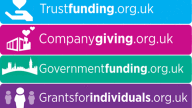Should my charity be using crowdfunding?
Get some top tips on how to use crowdfunding to its full potential.
Crowdfunding can be a great way for charities to raise money online, as well as engage supporters with their cause. You may have heard about a fantastic crowdfunding campaign which gained a lot of support and you want to replicate its success. However, in order to utilise this growing phenomenon you must ensure you have planned carefully. Here we take a look at some vital questions and things to consider before diving straight in.
Why do you want to use crowdfunding?
Money
If the primary goal for turning to this method is money, you must consider what the money will be used for. Is the money for core funding, such as paying for rent and operational costs? If so, you’re probably barking up the wrong tree. With this method of fundraising people want to see where their money is going and that’s why it works. For instance, if someone gives £30 to a crowdfunding campaign, they are implored to give because of the activity or project i.e. a new playground for the local park.
Engage with supporters
The buzz that surrounds a crowdfunding campaign can be a great way engage with supporters, both old and new. Chances are if you are going to the same people again and again with the same fundraising campaigns, both parties will most likely be suffering from fundraising fatigue. This method can be a good way to connect with your existing donors in a new, fresh way which can infuse some excitement back into your supporters. Coming to these donors with new ways of fundraising will also increase the chances of developing a longer term relationship with them. On the other hand, crowdfunding can also be useful if you are looking to cast your net wider to appeal to new supporters as it can inspire a sense of enthusiasm surrounding your cause.
Test the market
If your charity’s primary purpose is trading, for instance you are selling a product which has been made by your beneficiaries where the money goes back to help support them, you can use crowdfunding to test the waters. You may set up a crowdfunding page to see how much support or how many orders you receive upfront for the given product, which will help you to decide whether or not to go ahead with the project.
What can my charity get from crowdfunding?
Reinvigorate your fundraising
Feeling like your fundraising has gone stale is a worrying place to be. Crowdfunding can be a great way to shake up your fundraising or even your fundraisers. By no means should you see crowdfunding as ‘free money’ or the easy fix for this, but it can be integrated into your wider fundraising strategy to boost your efforts. With crowdfunding, around a third of support will come from your existing supporters, another third will come from your supporter’s extended network of friends and family and the last third would be dependent on the platform you choose. As you can see, you will need to rely on your existing support when crowdfunding but it can be a great way to rejuvenate your supporters.
Make the most of your social media footprint
If your organisation has a big social media footprint crowdfunding could be a good way to turn likes and retweets into practical, tangible support. If you have virtual support but haven’t been able to monetise that, crowdfunding could be a way to take advantage of this.
Social innovation
Say your fundraising team have come up with an idea that is quite ‘out-there’ or more creative than your normal campaigns; you may feel it is too risky to go to a funder or grant-maker with. Although funders may say they want innovative ideas they often want something they know is going to be successful, which could turn them off more unusual projects. Yet, if you want to do something socially innovative and take a risk, you may be able to contact your supporters or people who want to be part of something bigger via crowdfunding.
About Robert Foster
Robert is a co-founder of Red Ochre, which is a management consultancy that gives innovative and appropriate consultancy, research and training to clients so that they are better able to deliver their organisational objectives. His area of expertise include: Understanding, quantifying and communicating your impact and value, Social enterprise, diversified funding and trading options, Innovation, creativity and agile development and Commissioning, procurement and tendering.
